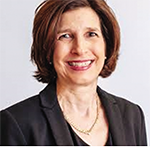Initially, the needs out in the field may be technical—minimally, you need a phone. Ideally, you need a computer with a webcam and a good Internet connection. If you don’t have such items or capabilities, ECHO will provide materials and tech support free of charge. “In larger clinics with multiple ECHO participants, we can install a polycom system so everybody can see/hear everybody,” Boyle says. This is also free, as is the entire training program, including CME credits, and certification registration in the ARHP Advance Rheumatology Course, an online program consisting of 19 core, adult, and pediatric modules.
She and Dr. Bankhurst had previous knowledge of the ARHP’s online course, but the $1,500 fee for participation was beyond most rural providers. ECHO worked with the ARHP to arrange a price per use that could be readily absorbed by ECHO’s overall budget. With cost considerations then set aside, Boyle felt that, if providers were willing to complete the course, it would demonstrate a commitment to ECHO and incentivize participation by offering this advanced rheumatology program certification. Health professional participants also received a year-long membership to the ARHP and its wealth of rheumatology resources. “We got a huge response to that,” says Boyle. “Our clinic participation doubled in one month.”
The ECHO process kicks off with interested parties coming to Albuquerque (expenses paid) for two days of intensive training—a “mini-residency” as Boyle puts it. “They go to an injection clinic and learn how to inject various joints, they learn about the meds, they take care of patients in our clinic with Dr. Bankhurst’s supervision,” Boyle says. If all goes well, access to the online course is provided, and training then continues remotely. To broaden education and assess training outcomes, ECHO participants are asked to present 10 cases a year to the rheumatology clinic to demonstrate knowledge of best practices, “to ensure that they are actively looking at how to translate this information to their particular patient population,” Boyle says.
Though the issue of material costs has been dealt with, there still remains the expense of time. “Our clinicians tune in during their lunch hour because they’re not allowed by their health facility to participate in any other way,” Boyle says. She hopes that this conflict can be addressed with the just-announced initiative to have payers reimburse clinics for the provider’s ECHO online presentation time; the coding is still to be worked out, but the reasoning is sound—this activity is obviously patient related.
Reach Out, Reap Rewards
“I didn’t find ECHO, really, though I’d heard of it,” says Dominic Tellez, PA, of Ben Archer Health Center in Radium Springs, N.M. “ECHO found me.” Dr. Bankhurst had given his ECHO/rheumatology presentation in the area, and Tellez was intrigued. “I didn’t know much about rheumatology, so I started listening in and eventually signed up for the training modules, and went up [to Albuquerque] for the hands-on training. I’ve hung in there ever since,” he says.



